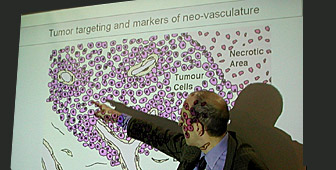Tumour targeting goes to clinical trials

Swiss and Italian researchers have progressed in their ability to destroy cancerous tumours by starving them of blood without damaging healthy tissue.
Clinical trials are now underway to see whether they can achieve the same success in humans that they have had with animals.
Professor Dario Neri from the Federal Institute of Technology in Zurich told swissinfo that his collaboration with the Cancer Research Institute in Genoa could yield enough information by the end of the year to proceed to the therapeutic phase.
“The beauty is that the target molecules we are bombarding with antibodies are identical in sequence in mouse, rat, dog, rabbit, monkey and man,” he said.
“One of the big problems normally with animal experiments is that you have different targets in different animals. Here the target is identical so the hope is that the results we saw in mice will be mirrored in the clinic.”
Searching for markers
The clinical trials follow five years of experiments on animals. The first step was to search for tumour markers – proteins which are common in tumours but, ideally, not present in healthy tissue. The researchers then developed human antibodies which recognised the tumour markers.
“We were the first group to develop human antibodies which recognised tumour blood vessels but not normal blood vessels,” said Neri. “They work like guided missiles, bringing drugs to the tumour blood vessels, ideally facilitating their destruction. The tumour dies because it is left without blood.”
In their latest research, which will be published in the March issue of Nature Biotechnology, the teams demonstrated the treatment’s effectiveness in animals.
They now have to demonstrate that the antibody goes where is it supposed to in patients with tumours. The first clinical trials have begun in Italy and permission has also been given in Zurich and Basel.
Next step
“If we can demonstrate that it is capable of localising efficiently and selectively in the tumour, then the way is open for the use of the antibody as a therapeutic agent,” said Neri.
The researchers say they currently have three promising markers. The first was discovered by Professor Luciano Zardi in Genoa and the other two were identified jointly.
“Ideally at the end of the year we will have enough information about which tumours can efficiently be targeted with these antibodies to move to the therapeutic phase of the project,” said Neri.
“In theory all tumours should be amenable to this intervention because most of the solid tumours have new blood vessels, which provide them with nutrients and oxygen.”
Exercising caution
Neri said that despite his hopes, he preferred to remain cautious until the outcome of the trials was known. “We have a number of promising results but they still have to be demonstrated in the clinic,” he said.
Rolf Stahil, president of the Swiss Institute for Applied Cancer Research, shared this view.
“Just the fact that there is a clinical trial is important news,” he told swissinfo. “But the result of the trial is even more important.”
“The hope so far (in the fight against cancer) has been with animal models and so far there has been no translation to the clinical situation but that doesn’t mean that there will be no advances in the future.”
by Vincent Landon

In compliance with the JTI standards
More: SWI swissinfo.ch certified by the Journalism Trust Initiative
You can find an overview of ongoing debates with our journalists here. Please join us!
If you want to start a conversation about a topic raised in this article or want to report factual errors, email us at english@swissinfo.ch.